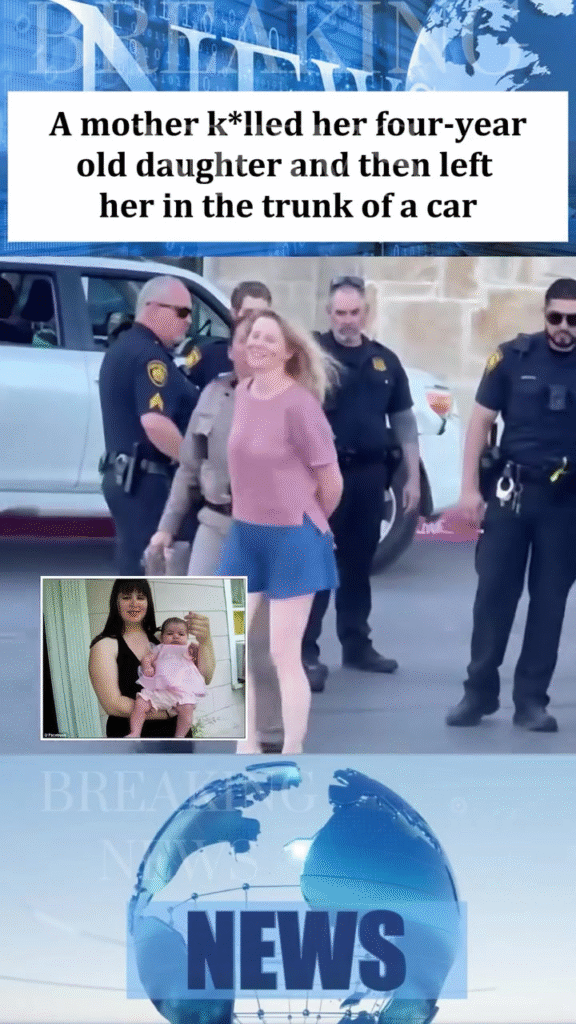In the quiet heart of Texas, a tragedy unfolded that left an entire community searching for answers. The story of 25-year-old Stacy Marie Parsons and her four-year-old daughter Victoria Wyatt has become a heartbreaking reminder of how emotional turmoil, untreated mental distress, and family breakdowns can turn devastating.
The nation watched in disbelief as details emerged — not of a distant stranger, but of a young mother whose love, once assumed to be unconditional, turned into confusion, despair, and irreversible loss.
This is not merely a story about a crime. It is a mirror reflecting the hidden battles many families face behind closed doors: jealousy, emotional instability, and the silent weight of mental health struggles that too often go unnoticed.
Today, we look deeper into this tragedy — not to sensationalize it, but to understand why it happened, how it might have been prevented, and what lessons every parent, community, and policymaker can take from it.
The Morning That Changed Everything
Early on a Monday morning, residents of a small Texas town woke to news that would ripple across the country. A young mother had walked into a local police station, visibly shaken, and confessed to something that would break the hearts of everyone who heard it.
According to official reports, Stacy Parsons calmly entered the police department, admitted she had taken her daughter’s life, and directed officers to where the child was found. The calmness of her confession was perhaps the most chilling detail, but beneath it lay years of emotional turbulence — tension that had quietly built up over time.
Investigators soon pieced together a grim timeline. The previous night, Parsons and her husband Gary Wyatt had argued. Gary had reportedly told his wife that he intended to end their marriage. The statement deeply affected her — and in the hours that followed, what should have been a moment of emotional reckoning instead spiraled into unimaginable tragedy.
When morning came, Gary believed his wife had taken their daughter to school. But what awaited him when Parsons returned home was a cryptic and haunting warning:
“If I were you, I wouldn’t be in that car.”
Those words would later echo through police interviews, community gatherings, and courtrooms — a symbol of how unpredictable and fragile the human mind can become when consumed by pain and jealousy.
A Family Torn Apart by Emotional Turmoil
To those who knew the couple, Stacy and Gary appeared like any other young family. They were in their twenties, working hard to build a stable life for their child. Friends described them as quiet but caring. Yet behind that surface, years of emotional tension had begun to erode their relationship.
Reports suggest that Stacy struggled with deep insecurity. She reportedly felt overshadowed by her daughter — a heartbreaking reality for anyone to imagine. While Gary focused his attention on providing for the family, Stacy’s jealousy and resentment grew stronger.
In hindsight, Gary revealed that his wife had spoken ominously about their relationship and had made worrying statements about preferring prison to continuing in an unhappy marriage. Those comments, once brushed off as emotional outbursts, later took on a tragic weight.
It’s easy to wonder: Could someone have stepped in? Could a neighbor, a friend, or a counselor have noticed the warning signs before it was too late?
Understanding the Psychology Behind Parental Violence
When parents harm their children, society often reacts with outrage — and rightly so. Yet, beneath that anger lies a need to understand the why.
Psychologists point out that cases like this are rarely about simple cruelty. They often involve untreated mental illness, severe emotional instability, or intense feelings of betrayal and loss.
In Parsons’ case, jealousy appears to have been the catalyst, but the underlying problem may have been far more complex. Mental health experts describe something known as “reactive psychosis” — a temporary but severe mental breakdown triggered by intense stress. In such states, individuals can lose their sense of rational thought and act impulsively, often in ways that contradict their core values and personality.
If such an episode was indeed a factor in this tragedy, it highlights the urgent need for early mental health support — especially for parents dealing with relationship breakdowns or postpartum emotional struggles.
The Hidden Crisis of Parental Mental Health
Across the United States, mental health professionals are sounding the alarm about a growing issue: parental burnout and untreated psychological distress.
Buy vitamins and supplements
Modern parents face unprecedented stress — economic pressure, social isolation, and the impossible expectations of being “perfect” caregivers. For those already dealing with trauma, depression, or low self-worth, the breakdown of a relationship can feel like a total collapse of identity.
Experts suggest that when emotional pain reaches such intensity, it can distort reality itself. In cases like Parsons’, jealousy might not have been simple envy — it may have been a desperate, delusional attempt to regain control in a life that felt utterly out of control.
However, while understanding mental health helps explain such tragedies, it can never excuse them. The loss of a child — innocent, dependent, and full of potential — is something no parent should ever cause, and no community should ever have to endure.
The Community’s Response: Grief, Confusion, and Compassion
The Texas community where the tragedy occurred was left in shock. Vigils were held, prayers were offered, and families came together in grief. Neighbors who once waved at the family from across the street now stood silently outside their homes, holding candles in memory of little Victoria.
Teachers at the preschool where Victoria was enrolled described her as bright, cheerful, and curious — the kind of child who brought joy wherever she went. Her loss was felt deeply, not just as the death of a child, but as the loss of possibility, laughter, and innocence.
Church leaders and mental health advocates in the community used the tragedy as a turning point — a chance to start open conversations about family conflict, emotional abuse, and the stigma surrounding therapy.
One counselor at a local community center shared,
“People are afraid to talk about what they’re feeling because they think it means they’re weak. But unspoken pain doesn’t go away — it grows until it breaks something.”
Those words resonated with many, echoing the importance of prevention through empathy, communication, and awareness.
Learning From the Past: Recognizing the Warning Signs
In nearly every family tragedy of this nature, there are subtle signals that something is wrong. Friends might notice a parent withdrawing from social life, expressing hopelessness, or displaying extreme jealousy or control issues.
Experts urge communities to recognize these warning signs not as drama or gossip but as cries for help.
Some of the key red flags that can indicate emotional instability include:
- Frequent statements about feeling worthless or trapped.
- Expressions of anger toward a spouse or child.
- Sudden withdrawal from friends and family.
- Obsessive or possessive behavior toward loved ones.
- Threats of self-harm or vague mentions of “ending it all.”
Recognizing these signs early can save lives. Support doesn’t always mean intervention through the police — sometimes it begins with a phone call, a listening ear, or helping someone access counseling services before despair takes over.
The Role of Society and Support Systems
While individuals are responsible for their actions, society also carries a shared responsibility: to provide support before crises turn tragic.
In many U.S. states, including Texas, community resources exist for families in distress — from domestic violence hotlines to mental health crisis centers. Yet, these services are often underfunded, understaffed, or not widely known.
Advocates argue that public education about emotional health should start early — not after tragedy strikes. Teaching children about emotional regulation, empathy, and communication in schools could lay a foundation for healthier relationships in adulthood.
Community outreach programs, churches, and social service agencies can also make a significant difference. Even something as simple as parenting workshops or accessible therapy sessions can help parents navigate emotional challenges before they escalate.
Justice and Accountability
As legal proceedings began, Stacy Parsons faced charges that could result in life imprisonment without parole. Her confession, while clear, also revealed a fractured mind — one unable to distinguish right from wrong in a moment of emotional collapse.
The justice system must balance compassion and accountability. Parsons’ sentence will likely reflect the severity of her actions, but her case also underscores a broader truth: punishment alone cannot prevent future tragedies.
True prevention lies in understanding, education, and intervention — ensuring that struggling parents have access to mental health care long before they reach a breaking point.
The Broader Conversation: Why Awareness Matters
Stories like this one are not isolated incidents. They are part of a larger pattern of family tragedies that share common roots — jealousy, emotional neglect, and untreated psychological pain.
Mental health advocates stress that open conversation is the key to breaking this cycle. The more we talk about the pressures parents face and the emotions they suppress, the easier it becomes to offer help before something irreversible happens.
National organizations such as NAMI (National Alliance on Mental Illness) and Childhelp provide resources for individuals experiencing family stress. Hotlines like 988, the national suicide prevention and crisis line, offer 24-hour support for anyone in emotional distress.
By normalizing help-seeking behavior, society can transform tragedy into awareness — and awareness into change.
A Community Moving Forward
Months after the incident, the small Texas town began slowly healing. A memorial garden was built in honor of Victoria Wyatt — filled with bright flowers and a small playground, symbolizing hope and renewal.
The community vowed that her memory would not fade into silence. Local schools implemented programs to educate students and parents on emotional health and conflict resolution. Churches organized family counseling sessions, and town meetings began to include discussions on mental well-being alongside traditional community topics.
Victoria’s story, though born in heartbreak, became a catalyst for awareness — proof that even in the darkest moments, light can emerge if people come together with compassion and purpose.
Conclusion: Turning Pain Into Purpose
The tragedy of Stacy Parsons and her daughter Victoria Wyatt is a devastating reminder that emotional pain, when left unaddressed, can destroy even the most sacred bonds. Yet it also reveals something profound about the human spirit — our ability to learn, to grow, and to transform loss into understanding.
Every community has the power to prevent such heartbreak. By fostering empathy, breaking the stigma surrounding mental health, and offering support to families in crisis, we can ensure that no parent feels so lost, and no child so unprotected, again.
Let this story not be one of despair, but one of awakening.
Let it inspire conversations, compassion, and action — because awareness saves lives.




